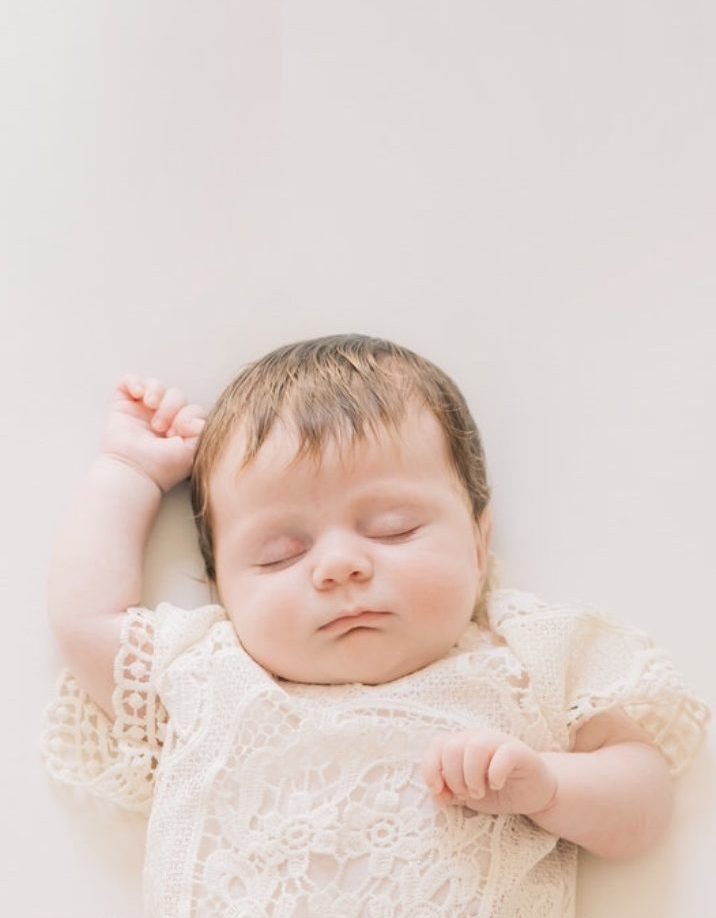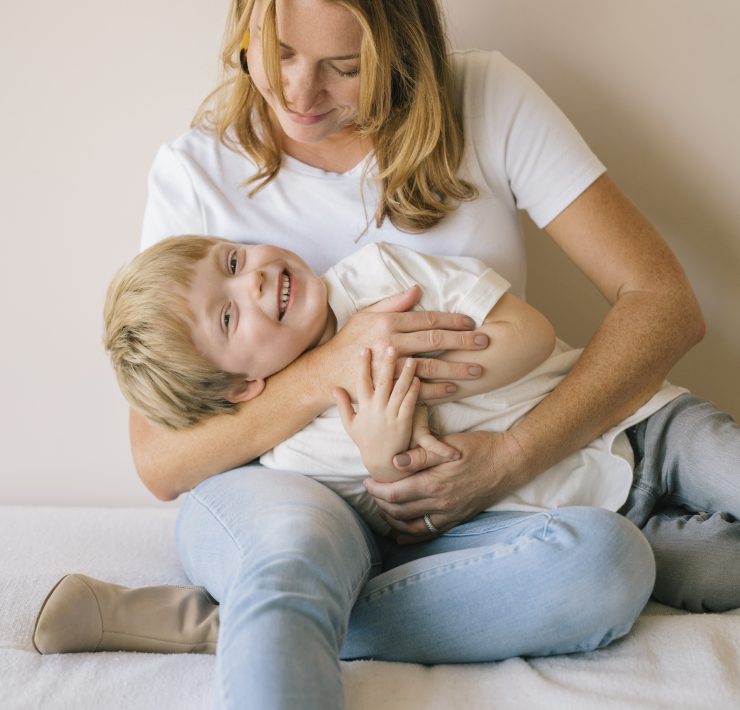
Lia De Feo on parenting after two late-term losses.
An hour after our surrogate, Marissa, delivered our daughter, my husband and I found ourselves alone with our newborn for the first time. We stood on opposite sides of the bassinet and stared down at our miracle — our double-rainbow baby. My heart was overflowing with love and appreciation. I looked up at my husband as he said, “I’m so glad we didn’t give up.” In that moment, I believed he was telepathic. I was about to say the exact same thing.
Giving up was a real possibility for us. After my son Christopher was stillborn at 31 weeks due to an unexpected uterine rupture, we were devastated. But I knew two strong women, both cancer survivors, who started their families via surrogacy, and their stories inspired me. I was hopeful that I would follow in their footsteps and that my rupture and subsequent inability to carry wouldn’t be the end of my path to motherhood. It had taken so long for us to get pregnant, and we were so behind in terms of when we wanted to have a baby, that we moved forward with surrogacy shortly after we lost Christopher. We were matched with a wonderful surrogate, Katherine, who carried our baby as if it were her own. We joined her in Kentucky for the 20-week ultrasound, and everything was perfect. So we were shocked when, at 29 weeks, our daughter Avellina was born with an incurable heart condition and passed away just two hours later. After Avellina’s death, giving up felt like the only option.
We did “give up” for a couple of months. I tried to convince myself that my husband and stepdaughter were enough for me. We had spent our entire savings on surrogacy, so it didn’t feel like we had a choice. But then I learned something that pushed us to move forward again. The media company I was working for offered both surrogacy and IVF benefits, along with an option for us to borrow against our 401k tax-free. I was 40, and I knew if we didn’t try again now, we never would.
So we did.
Our last round of IVF and second surrogacy journey brought us our daughter, Carolina.

After two late-term losses, we almost couldn’t believe that Carolina was here and healthy. It truly amazed us, and we were so grateful to our surrogate and everyone who cheered us on along the way. But parenting after loss is a unique brand of motherhood.
Many new moms fear that their baby will die in their sleep. But most don’t wake up multiple times a night and put their hand on their baby’s chest to make sure they are still breathing. As a mother parenting after loss, I checked on my sleeping baby an inordinate amount of times, especially in the first few months. When I checked on her and she was ok, I was flooded with relief. But every so often, I would get a glimpse of her sleeping face, and she would look so much like Avellina that I couldn’t help but feel overcome by grief and sadness.
Something meant to be positive turned into something triggering and sad — a reoccurring theme in motherhood after loss.
When Carolina was 12 weeks old, we hired a photographer to capture our family photos. During the shoot, she focused on getting the classic sleeping newborn shot. At the time, I didn’t think twice about it. But when the photos came back to us, my heart sank. Objectively, they were beautiful, but every photo of my healthy, ALIVE baby girl with her closed eyes reminded me of our losses. The one photo we took of Christopher after he was stillborn. The photos of Avellina during those precious two hours when she didn’t have the strength to open her eyes. Something meant to be positive turned into something triggering and sad — a reoccurring theme in motherhood after loss.
When Carolina was 10 months old, my husband traveled to California for work. I was home alone with her for the first time when she developed a cold and a fever of 102.5. I called the doctor in a complete panic, and he suggested I give her Motrin, continue to monitor her temperature, and take a few deep breaths. Carolina had spiked a fever before, but not on a Friday night when our pediatrician’s office was closed, and not when I was alone with her. I continued to give her Motrin, and on Saturday, her temperature suddenly plummeted to 93 degrees. The doctor told us to go the go to the hospital immediately. I panicked. I looked around and thought, “What if she dies? How do I want to leave the apartment?” I had flashbacks of coming home from the hospital without a baby twice before and seeing a crib, tiny clothes and stuffed animals. Should I hide her things in the closet, just in case I come home without her? I knew it was irrational, but it was how I felt at that moment, and it was awful. It turned out that Carolina had a very, very rare reaction to Motrin — hypothermia — and once the medication passed through her system, she recovered.

A few months later, she dug a new toy out of the toy bin. A little gray elephant. Time stood still for a moment as my blood ran cold. It was the elephant that her older step sister, Marianna, had picked out to give to Christopher. I have no idea how it got into the bin, but it brought me back to the moment that Marianna picked it out in Ikea when I was pregnant and we were shopping for furniture for the baby. I was overcome with sadness.
There’s a beautiful book, Guess How Much I Love You, by Sam McBratney. During my pregnancy, I kept the book by my bed and I read it often to my unborn baby. When Carolina arrived, we were gifted multiple copies of the book. Four, to be exact. Yet I hardly ever read it to her. I can’t say the words without tears welling up in my eyes.
I have countless stories of should-be joyous moments that trigger my grief. In the beginning, the reminders of the babies we lost were nearly impossible to recover from. They changed the tone of my day and impacted my mental focus. Carolina is now 20 months old, and when she pulls out Christopher’s elephant or does something that reminds me of Avellina, it’s not as triggering as it once was. Don’t get me wrong, I still cry because I miss them. But I now embrace that mothering after loss means loving the baby you have in your arms while never forgetting the babies you have in your heart. I love all three of my babies “to the moon and back.”
Lia De Feo is a mother via surrogacy and the founder of Fly Bravely, a consultancy dedicated to de-stigmatizing infertility and raising awareness of infant loss. Follow on Instagram for inspiration, virtual support groups and more.


